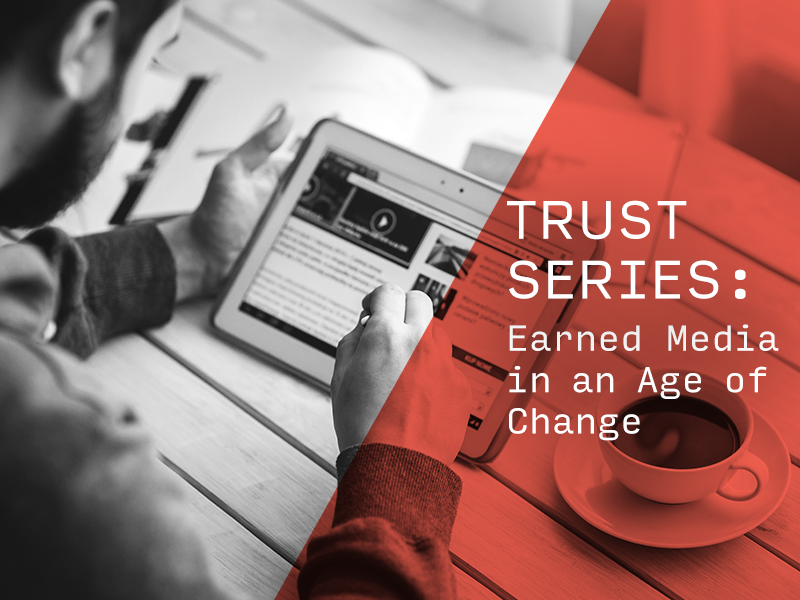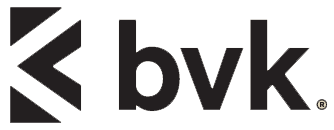Trust Series | Build Authenticity and Accountability with PR
Thinking Big

Here’s what you’ll learn:
- The Trust Series reviews the first half of 2020 and shares how brands can use earned media practices to build trust, confidence and empathy with their audiences during turbulent times
- Catching up? Click here to check out our first post in the series analyzing the current state of consumer trust in brands and media
- Today’s post dives into how brands can use public relations to listen, speak and engage to ensure authenticity and accountability in an age of change
In a rapidly evolving world, consumers, media and stakeholders expect consistent, authentic communications from brands. Whether through media outreach, crisis communications or issues management, public relations (PR) is at the core of a brand’s ability to not just survive disruptive events like the pandemic or demands for societal change, but set up the foundation to thrive beyond them.
The first post in our Trust Series established earned media as one of the most important factors in the gain or loss of consumer trust. In response, smart marketers need to adopt an “always on” approach to PR consisting of 24/7 media monitoring, timely storytelling and integrated, meaningful action. Yet, while demand and consumption for news is at an all-time high, one of the biggest challenges for brands remains sharing their point of view in a way that will resonate both with stakeholders and journalists.
So, how can your brand use PR to build a platform of empathy, positivity and reliability in an age of change? Following are our top strategies to effectively listen, speak and engage — during the heart of a disruptive event and well into brand recovery.
1) Listen: Know the News Before it Happens
As a society, we place so much emphasis on the action that we often forget what should come first: listening. Gone are the days of solely monitoring what is being said within your brand sphere. Effective listening involves monitoring, analyzing and interpreting trends and emerging issues both inside and outside your brand and industry and digging deep into what your consumers value, crave and demand. By taking a genuine interest in the multiple facets surrounding your brand, you can cultivate a multi-dimensional PR listening practice that drives an impactful, purposeful response. Here’s how:
- Effectively monitor: Identify not just the media outlets, but also the people, partners, and competitors of greatest importance to your audience and organization. Then, make sure your team is closely monitoring each entity via media intelligence software, social media and enhanced social listening tools.
- Keep a pulse: Work with your team to curate daily, weekly and/or monthly insights reports to monitor and track stories from in and around the industry before they happen. Keeping a pulse on news, industry and social listening insights can help your team assess and address potential issues before they become a crisis.
- Listen to editors: Editors are on the frontlines of the news. They drive insights and are an invaluable resource on evolving topics. Hard-earned, long-standing relationships build trust and solidify editors as an extension of your brand. A strong PR team expertly nurtures these relationships to gauge questions, interests, and emerging priorities and marry editorial opportunities with your brand.
2) Speak: Be Empathetic and Be Real
Especially during times of unrest, every communication — whether a media pitch, statement, or branded collateral — should begin with empathic communications. The more human the message, the better. But, when it comes to building trust related to the topics that matter most, it is not enough to simply craft a templated statement or social media post. This can come across as performative and quickly put your brand in jeopardy. Instead, follow the steps below:
- Have a plan: Collaborate with your team to develop both a crisis communications plan and an issues management strategy. Your communications protocols should provide guidance for why, when and how to engage with your audience. While crises are clear, issues can be more difficult to detect. Issues management is an anticipatory, strategic management process that helps brands detect and respond appropriately to emerging trends or changes in the societal environment. These trends or changes may then develop into an issue, which is a situation that evokes the attention and concern of stakeholders, such as the recent protests over equity.
- Be real: The success of your brand’s response depends on two critical elements: authenticity and accountability. Carefully filter every communication through your brand values and associated pillars, causes and partnerships. If an issue arises that your brand does not have a clear stance or position on, take a step back and do a litmus test against your values. If, after careful consideration, you would like to take a stand, make sure to be honest and transparent with your communications. Is this a new arena for your brand? Clearly state your intentions. Do you have work to do? Admit it and share progress.
- Find your voice: Ideally you will have one person — or a small group of individuals based on their expertise — that serves as the face of your PR efforts. Depending on the level of impact, we recommend the C-suite to demonstrate leadership is visible, caring and engaged. Consider this: The Morning Consult’s latest CEO Brand Intelligence research revealed the most important attribute driving a CEO’s performance and reputation is a positive contribution to society. Other top drivers included acting in the best interest of customers and society, making a difference and authenticity.
3) Engage: Do Your Actions Speak Louder Than Your Words?
Your brand values, PR efforts and corporate social responsibility initiatives need to be interconnected. As such, the PR team should be engaged in frequent dialogue with members of your executive, corporate communications, community relations and HR teams to ensure communications are backed up by accountable actions. Here are few considerations for starting the conversation:
- Engage your community: Eighty seven percent of consumers expect businesses to have a positive impact on society/environment (Kantar Consulting 2018 U.S. Monitor). Community relations should be a cornerstone of your overall brand strategy and, like PR, a year-round endeavor. That said, amidst these changing times, now is a good time to check in on your community outreach strategy. Identify cause opportunities and partnerships that align with your brand’s core values. Carefully assess the health of your existing partnerships, including their response to societal events, engagement milestones and opportunities to make an even greater impact. If you are considering taking on a new partner, make sure to engage with organizations that your brand can support now and the future.
- Take sustainable action: Your words need to be backed up by consistent, sustainable action. Did you announce a plan to support small businesses through an emerging leadership program? What about that pledge to diversify your board by 2022? Be prepared to share progress and results with internal and external audiences through corporate communications and PR.
- Be accountable: Do your outward actions reflect your internal activities? The same promises you make to your external stakeholders should ring true for your employees. If you sell LGBTQ+ merchandise but fail to have an inclusive workforce, there is a disconnect. Ensure checks and balances are in place through regular progress updates; management training; special interest groups, such as employee resource groups; and internal communications that reinforce core values including messages from leadership, fireside chats and newsletters.
These are the steps creating a PR strategy that enables your brand to effectively listen, speak and engage. Is an engaged PR team essential during reputation management and brand recovery? Yes, but that does not mean you should only leverage PR during a crisis or disruptive event. Public relations, like all components of earned media, should be always on, always engaged and already ready to tell your brand story. That way, when you have something important to say, the right people are tuned in, listening and ready to join forces and help elevate your message.
Now is the time to take meaningful action. Are you interested in leveraging PR to elevate your brand’s efforts and build trust in an age of change? Let’s chat. Contact Sarah Schmidt at [email protected], Lauren Murray at [email protected] or Julie Caan at [email protected] to learn more.
